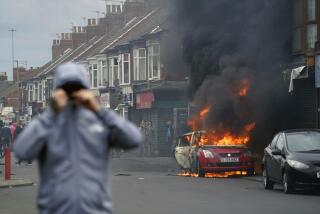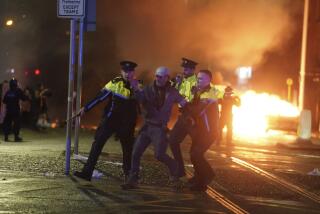Racist violence drives Romanians from homes in Northern Ireland
- Share via
LONDON — More than 100 Romanians in Northern Ireland were left scrounging for shelter Wednesday after being driven from their homes in a spate of racist violence that has shocked a region still nursing the wounds of decades of sectarian conflict.
Officials and community leaders in Belfast, Northern Ireland’s capital, roundly condemned the attacks, whose targets were ethnic Roma, or Gypsies, a minority group that has been subject to discrimination and mistreatment across Europe. No injuries were reported. Among the displaced was a 5-day-old baby.
Gangs of youths in south Belfast began taunting and threatening the immigrants last weekend. When the harassment escalated into rock- and bottle-throwing that shattered windows, terrorized residents and even targeted a counter-demonstration against racism Monday, the families grabbed what belongings they could and fled.
On Wednesday, they were bused to a recreation center after spending the night in a church hall. Small children clutched their parents’ hands as city officials and social workers scrambled to find emergency housing for people too afraid to return to their homes.
“It really does shake your humanity to look at all of that and to think that there are people within our society who are prepared to inflict all of this on defenseless babies and their parents,” Martin McGuinness, the deputy first minister of Northern Ireland, said after visiting the families.
British Prime Minister Gordon Brown also condemned the attacks, which come against a backdrop of increased violence against Roma throughout Europe -- especially countries in the east, such as Hungary and the Czech Republic -- as economies flounder, joblessness rises and angry residents look for scapegoats.
Far-right parties that espouse expulsion of immigrants and ethnic minorities made gains in recent elections for the parliament of the European Union.
Britain, albeit one of the more diverse and tolerant nations within the 27-member EU, is not immune to this. Last week, the British National Party, which does not allow nonwhite members, won two seats in the European Parliament.
Like other parts of Britain, Northern Ireland has seen the number of newcomers grow significantly as Eastern Europeans, exercising their right to move across borders within the EU, arrive in search of better lives.
Reports of racially motivated and nationalistic hate crimes have risen in the province, adding a new overlay of violence to a society already scarred by political and religious turmoil. More than 3,000 people were killed during the so-called Troubles that engulfed Protestants and Roman Catholics.
“These are citizens of the world, and we have to treat them as that. . . . They are welcome on our island and they have rights,” Caitriona Ruane, a member of the Northern Ireland Assembly with the Sinn Fein party, said of the Romanian families. “We have to isolate the small minority of people who are very racist in their attitudes.”
Police say there is no evidence of any connection between the thugs who carried out the attacks and paramilitary organizations, which have been linked to racist violence in the past.
--
More to Read
Sign up for Essential California
The most important California stories and recommendations in your inbox every morning.
You may occasionally receive promotional content from the Los Angeles Times.














